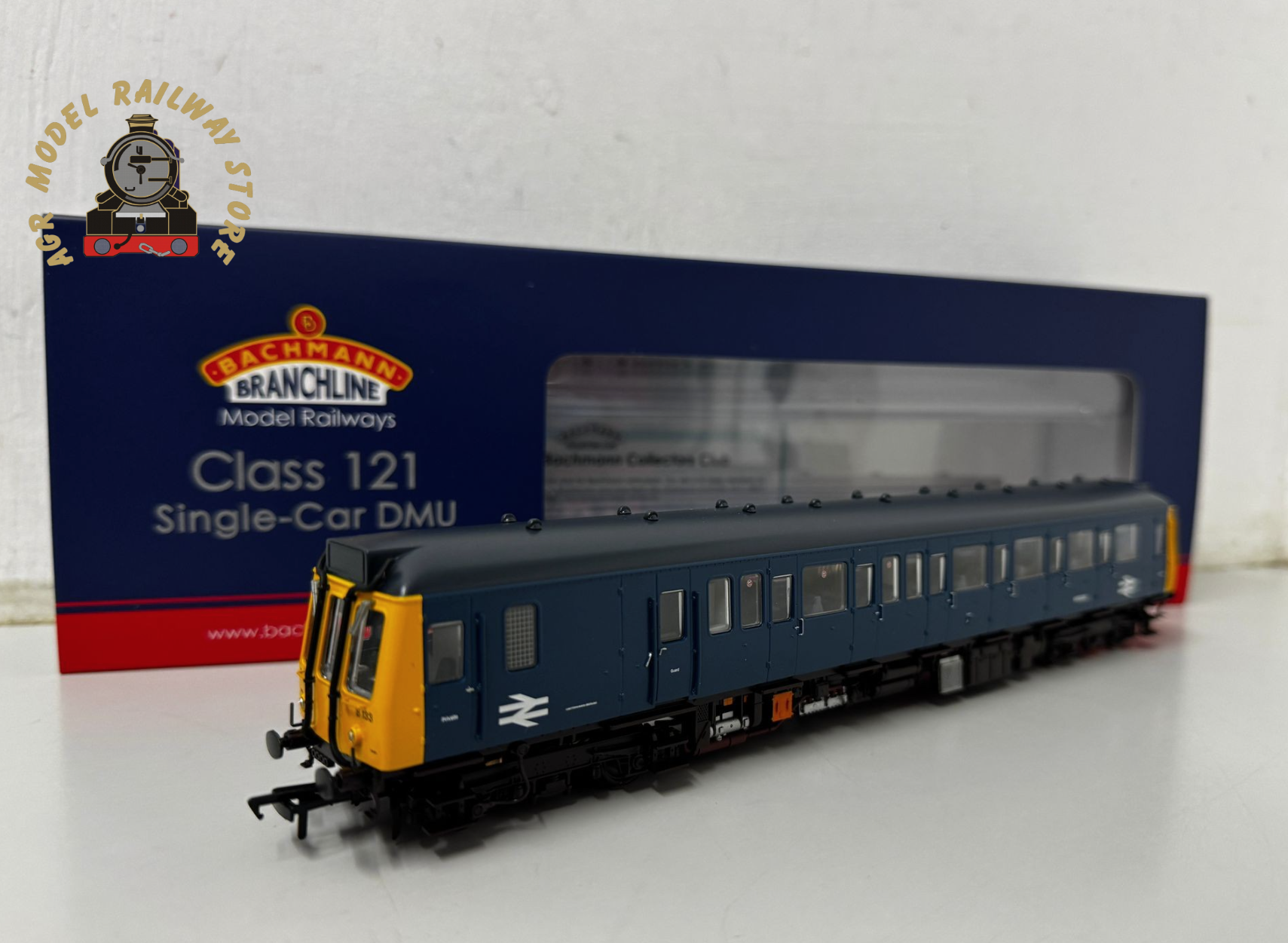Bachmann 35-529 Class 121 Single-Car DMU W55033 BR Blue – OO Gauge
The Class 121 single-car Diesel Multiple Unit (DMU) is Bachmann Branchline’s flagship First Generation multiple unit, equalled only by its 3-car Class 117 stablemate. Employing cutting edge technology, these high fidelity models boast a wealth of detail and era-specific options to depict specific railcars at various points during their working careers which, for some, extended towards 60 years in service. Returning to the Branchline range in a selection of new liveries, these iconic suburban DMUs will make a fine addition to any model railway set in the steam-diesel transition period onwards.
Capturing the look and character of the prototype, this Class 121 is adorned with many separate detail components whilst underneath the engine, drive gear and auxiliary equipment is all depicted faithfully. It may be hard to believe, but within these components and integrated into the underframe is hidden the drive mechanism, which is totally invisible with no intrusion into the interior of the model. Talking of the interior and the fine detail extends inside the model too, complete with prototypical decoration. The livery application is executed to a high standard both inside and out, using accurate colours and authentic fonts, typefaces and logos to stunning effect.
Driven by the low profile mechanism, the technology continues with the lighting suite which includes directional lights, interior cab and passenger saloon lights, and Illuminated headcode boxes and destination blinds, all of which can be enjoyed by analogue users – controlled with the under-chassis switches – or via dedicated functions on DCC. With a Plux22 DCC decoder socket and pre-fitted speaker, these models are ready for sound or why not opt for a SOUND FITTED which provides authentic sound effects on both DCC and Analogue Control straight out of the box!
MODEL FEATURES:
- Bachmann Branchline OO Scale
- Era 7
- Unit is Preserved
- Pristine BR Blue Livery
- Running No. W55033
- Destination Blinds for Bristol T.M. and Severn Beach
- Equipped with a PLUX 22 DCC Decoder Socket
- Length 278mm
BACHMANN BRANCHLINE CLASS 121 SPECIFICATION
MECHANISM:
- Three pole motor and flywheel providing drive to the bogie at the guard’s compartment end
- Two axle drive
- Separate metal bearings fitted to each driven axle
- Trailing axles run in metal pinpoint bearings
- Electrical pickup from all wheels
- Diecast metal, multi-stage gearbox, with gearing arranged for prototypical running speeds and haulage capabilities
- 16.5mm (OO gauge) wheels to NEM310 & NEM311 standards with authentic profile and detailing
- Detachable coupling pockets to NEM362 standards fitted to each bogie
- Designed to operate on curves of second radius (438mm) or greater
DETAILING:
- Separately applied detail parts, including metal lamp irons and cab end handrails, exhaust pipes and windscreen wipers
- Bogies constructed from multiple components featuring brake and suspension detail and steps where prototypically appropriate
- Speedometer with flexible connection between bogie and solebar
- A wealth of separately fitted underframe components including engines, exhaust systems, electrical gear and auxiliary equipment
- Interior detailing including seating, partitions and driver’s chair and control desk in each cab
- Sprung metal buffers
- Each model is supplied with a full set of decorated bufferbeam pipework and accessory parts
LIGHTING:
- Directional lighting, including illuminated headcode panels* and high intensity headlights*, switchable on/off independently at either end via the chassis-mounted switches or via dedicated DCC functions (*where applicable to the prototype being modelled)
- Separately illuminated destination panels, switchable on/off independently at either end via the chassis-mounted switches or via dedicated DCC functions
- Passenger saloon lighting – switchable on/off via the chassis-mounted switches or via a dedicated DCC function
- Cab interior lighting – switchable on/off via the chassis-mounted switches or via a dedicated DCC function
- Authentic light colours and temperatures selected for each lighting application
DCC:
- Plux22 DCC decoder interface
SOUND:
- A quality speaker employed for optimum sound reproduction, fitted to every model as standard
- Zimo MS450P22 DCC Sound Decoder fitted to SOUND FITTED versions
- Sound files produced specifically for the Bachmann Branchline Class 121 DMU using recordings from real units
- SOUND FITTED models operate on DCC and Analogue control as supplied
LIVERY APPLICATION:
- Authentic liveries applied to all models including interior decoration
- Multiple paint applications employed using BR and corporate specification colours
- Logos, numerals and text added as appropriate using multi-stage tampo printing using authentic typefaces, logos and colours
CLASS 121 HISTORY
Thought to be the UK’s longest serving first generation Diesel Multiple Unit (DMU), the Class 121s were first introduced in 1960. Nicknamed ‘Bubble Cars’, a total of 16 Class 121 Driving Motor Brake Second (DMBS) units were built by the Pressed Steel Company between 1960 and 1961 following the same basic design of the Class 117 3-Car DMU, featuring the standard ‘Derby’ cab and high-density seating. They were similar to the Class 122 DMUs but were distinguished by the presence of the four character headcode box above the cab. The single car units had a cab at each end, plus a guard’s area and seating for 65 passengers. Where additional capacity was required the Class 121s could be coupled with other DMUs that had blue square multiple working equipment.
Delivered to the Western Region, the units were intended for use on branch lines in Cornwall and the Thames Valley. The Class later spread further across the Western Region, whilst also moving to other areas in due course, with several examples ending up with Network SouthEast following Sectorisation. Many of the Class were later repurposed for Departmental work although three remained in passenger service with Silverlink following Privatisation. Chiltern Railways were the final operator of the Class 121s, using two for services between Aylesbury and Princes Risborough, the final unit was withdrawn in 2017. A significant number of the Class survive in preservation.





